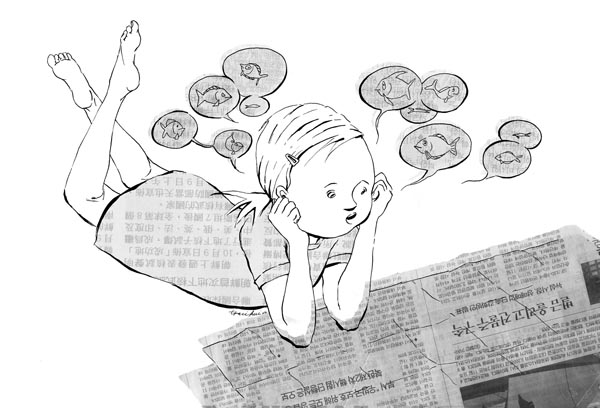The Developmentally Disabled Blonde Girl From Oklahoma City Who Spoke Perfect Korean
fiction by Ben Bush
illustration by Traci Hui
MOST OF the babies born in Oklahoma City in 1972 weren’t born with a preference for any particular language. They were born with brains eager to learn English or French or Taiwanese or the Cherokee language of Tsalagi. But there was a little girl born with textbook perfect Korean inside of her head. When the doctor pulled her soft round skull into this world she wailed “Gamsa hamnida!”
Her parents were second-generation Oklahomans who traced their ancestry back to the Mayflower. They didn’t understand Korean. They thought the sounds their child made were just the usual baby gibberish.
Her parents waited for her first word of English. They were still waiting when she had learned to walk. Her bald head sprouted shoulder-length blond hair and they were still waiting. Instead she spoke a steady stream of proper Korean, which no one understood.
When it came time, her parents enrolled her in public school. The district classified her as developmentally disabled and she attended classes in a portable trailer unit behind the school. The porta-classroom smelled like brand new carpet and fresh paint and had smelled that way for eight years.
A blind man sat on a chair just outside the schoolyard fence. He sold #2 pencils out of a tin can. Sales were always brisk during test week when the students had to fill in the bubbles on Scantron computerized test forms. He also had a little organ grinder monkey. For a quarter the monkey would play a song from any Lerner and Lowe musical on his 20-note Balchyn organ.
The downtown business district would have been a more profitable location, but the blind man didn’t leave. He stayed because the schoolyard was built where his family’s farm had once been. In the days before the dustbowl they had raised alfalfa, but the bank foreclosed when the crops failed. Underneath the concrete playground was some of the richest soil in the surrounding five counties. Alfalfa seedlings still sprouted from around the base of the tetherball pole.
On her way home from school she would often stop and listen while the monkey played “Wouldn’t It Be Loverly” or “The Heather on the Hill.” She was glad to hear music without words. So often music was cluttered with words she couldn’t understand.
“Scree scree,” the monkey would wave as the girl passed by.
One afternoon when she got home her mother was unpacking a shopping bag, and she pulled out what looked like the evening newspaper. The girl was surprised when her mother unrolled the newspaper and there was a fish inside.
On the newspaper, the girl saw an alphabet she’d been missing like a long lost friend. It was the shapes she saw on the inside of her eyelids as she was falling asleep. She read of the promulgation of the revised socialist constitution in the North. She read how Park Chung Hee had made himself president for life with the Yusin amendment in the South. She sat in the middle of the newspaper reading and re-reading it beside the warm oven while her mother cooked. Fish moisture had obscured some of the important parts, but the girl made up what words she thought might have gone there.
For a week the girl dragged the newspaper along with her the way the other children carried a favorite blanket or teddy bear. One afternoon she took it with her in the car while her mother was running errands. Her mother needed a ham bone for stew that night. She parked the car in front of the Korean butcher shop.
The girl looked up at the man behind the counter. “Annyong haseyo?” she said in greeting.
The butcher was midway through carving a leg of lamb, and his knife clattered to the floor. He hadn’t expected to hear his language coming from the mouth of a tiny blond girl. Soon they were engaged in a heated political debate about some of the issues that had been wrapped around last week’s salmon. Although they differed on the viability of the student uprisings, the girl found endless pleasure in at least being understood.
The mother was speechless with surprise that anyone understood her daughter.
After that the girl always went straight from school to work at the butcher shop. She spent her afternoons making deli-thin slices of sagogi and dwaejigogi. She missed hanging around the schoolyard listening to the organ, so she invited the blind man and the monkey to join her. The monkey worked behind the counter. His skills at organ grinding easily transferred to grinding hamburger.
Ben Bush is a reporter for the Martinez News-Gazette. His journalism and criticism has appeared in the San Francisco Chronicle, Bitch, Poets and Writers, Alternet, XLR8R, San Francisco Bay Guardian, the Portland Mercury, thefanzine.com and Whatcha Mean, What’s a Zine? (Houghton Mifflin).
